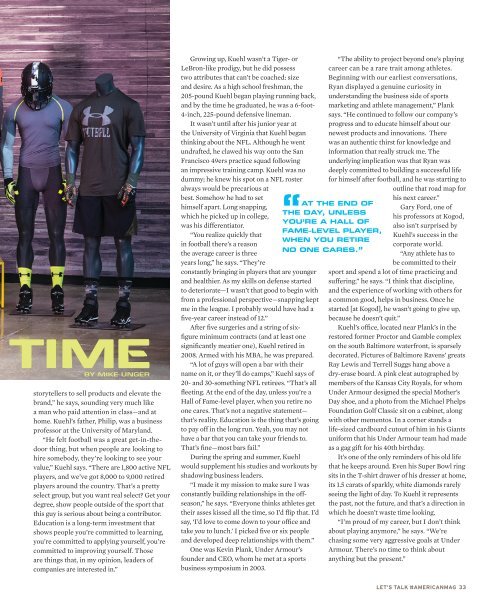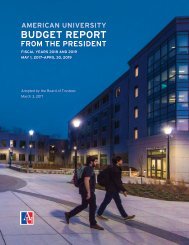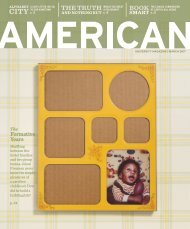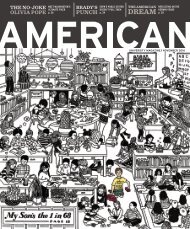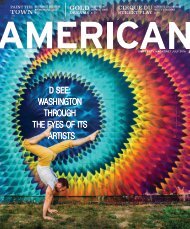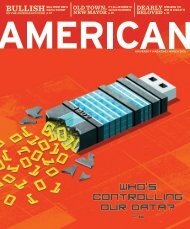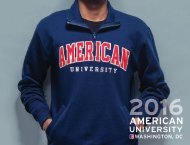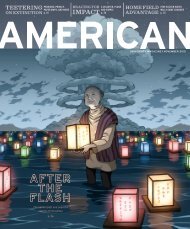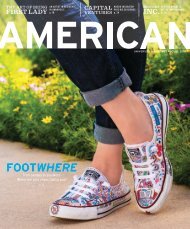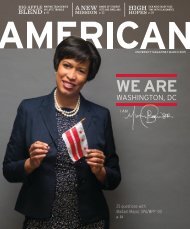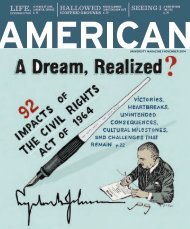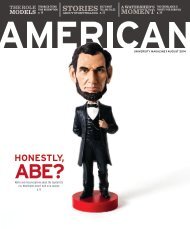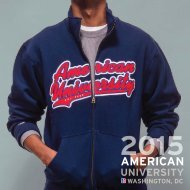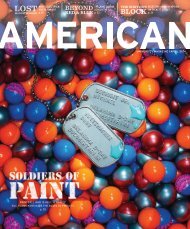Create successful ePaper yourself
Turn your PDF publications into a flip-book with our unique Google optimized e-Paper software.
storytellers to sell products and elevate the<br />
brand,” he says, sounding very much like<br />
a man who paid attention in class—and at<br />
home. Kuehl’s father, Philip, was a business<br />
professor at the University of Maryland.<br />
“He felt football was a great get-in-thedoor<br />
thing, but when people are looking to<br />
hire somebody, they’re looking to see your<br />
value,” Kuehl says. “There are 1,800 active NFL<br />
players, and we’ve got 8,000 to 9,000 retired<br />
players around the country. That’s a pretty<br />
select group, but you want real select? Get your<br />
degree, show people outside of the sport that<br />
this guy is serious about being a contributor.<br />
Education is a long-term investment that<br />
shows people you’re committed to learning,<br />
you’re committed to applying yourself, you’re<br />
committed to improving yourself. Those<br />
are things that, in my opinion, leaders of<br />
companies are interested in.”<br />
Growing up, Kuehl wasn’t a Tiger- or<br />
LeBron-like prodigy, but he did possess<br />
two attributes that can’t be coached: size<br />
and desire. As a high school freshman, the<br />
205-pound Kuehl began playing running back,<br />
and by the time he graduated, he was a 6-foot-<br />
4-inch, 225-pound defensive lineman.<br />
It wasn’t until after his junior year at<br />
the University of Virginia that Kuehl began<br />
thinking about the NFL. Although he went<br />
undrafted, he clawed his way onto the San<br />
Francisco 49ers practice squad following<br />
an impressive training camp. Kuehl was no<br />
dummy; he knew his spot on a NFL roster<br />
always would be precarious at<br />
best. Somehow he had to set<br />
himself apart. Long snapping,<br />
which he picked up in college,<br />
was his differentiator.<br />
“You realize quickly that<br />
in football there’s a reason<br />
the average career is three<br />
years long,” he says. “They’re<br />
constantly bringing in players that are younger<br />
and healthier. As my skills on defense started<br />
to deteriorate—I wasn’t that good to begin with<br />
from a professional perspective—snapping kept<br />
me in the league. I probably would have had a<br />
five-year career instead of 12.”<br />
After five surgeries and a string of sixfigure<br />
minimum contracts (and at least one<br />
significantly meatier one), Kuehl retired in<br />
2008. Armed with his MBA, he was prepared.<br />
“A lot of guys will open a bar with their<br />
name on it, or they’ll do camps,” Kuehl says of<br />
20- and 30-something NFL retirees. “That’s all<br />
fleeting. At the end of the day, unless you’re a<br />
Hall of Fame-level player, when you retire no<br />
one cares. That’s not a negative statement—<br />
that’s reality. Education is the thing that’s going<br />
to pay off in the long run. Yeah, you may not<br />
have a bar that you can take your friends to.<br />
That’s fine—most bars fail.”<br />
During the spring and summer, Kuehl<br />
would supplement his studies and workouts by<br />
shadowing business leaders.<br />
“I made it my mission to make sure I was<br />
constantly building relationships in the offseason,”<br />
he says. “Everyone thinks athletes get<br />
their asses kissed all the time, so I’d flip that. I’d<br />
say, ‘I’d love to come down to your office and<br />
take you to lunch.’ I picked five or six people<br />
and developed deep relationships with them.”<br />
One was Kevin Plank, Under Armour’s<br />
founder and CEO, whom he met at a sports<br />
business symposium in 2003.<br />
“The ability to project beyond one’s playing<br />
career can be a rare trait among athletes.<br />
Beginning with our earliest conversations,<br />
Ryan displayed a genuine curiosity in<br />
understanding the business side of sports<br />
marketing and athlete management,” Plank<br />
says. “He continued to follow our company’s<br />
progress and to educate himself about our<br />
newest products and innovations. There<br />
was an authentic thirst for knowledge and<br />
information that really struck me. The<br />
underlying implication was that Ryan was<br />
deeply committed to building a successful life<br />
for himself after football, and he was starting to<br />
outline that road map for<br />
his next career.”<br />
“AT THE END OF<br />
THE DAY, UNLESS<br />
YOU’RE A HALL OF<br />
FAME–LEVEL PLAYER,<br />
WHEN YOU RETIRE<br />
NO ONE CARES.”<br />
Gary Ford, one of<br />
his professors at Kogod,<br />
also isn’t surprised by<br />
Kuehl’s success in the<br />
corporate world.<br />
“Any athlete has to<br />
be committed to their<br />
sport and spend a lot of time practicing and<br />
suffering,” he says. “I think that discipline,<br />
and the experience of working with others for<br />
a common good, helps in business. Once he<br />
started [at Kogod], he wasn’t going to give up,<br />
because he doesn’t quit.”<br />
Kuehl’s office, located near Plank’s in the<br />
restored former Proctor and Gamble complex<br />
on the south Baltimore waterfront, is sparsely<br />
decorated. Pictures of Baltimore Ravens’ greats<br />
Ray Lewis and Terrell Suggs hang above a<br />
dry-erase board. A pink cleat autographed by<br />
members of the Kansas City Royals, for whom<br />
Under Armour designed the special Mother’s<br />
Day shoe, and a photo from the Michael Phelps<br />
Foundation Golf Classic sit on a cabinet, along<br />
with other mementos. In a corner stands a<br />
life-sized cardboard cutout of him in his Giants<br />
uniform that his Under Armour team had made<br />
as a gag gift for his 40th birthday.<br />
It’s one of the only reminders of his old life<br />
that he keeps around. Even his Super Bowl ring<br />
sits in the T-shirt drawer of his dresser at home,<br />
its 1.5 carats of sparkly, white diamonds rarely<br />
seeing the light of day. To Kuehl it represents<br />
the past, not the future, and that’s a direction in<br />
which he doesn’t waste time looking.<br />
“I’m proud of my career, but I don’t think<br />
about playing anymore,” he says. “We’re<br />
chasing some very aggressive goals at Under<br />
Armour. There’s no time to think about<br />
anything but the present.”<br />
LET’S TALK #AMERICANMAG 33


